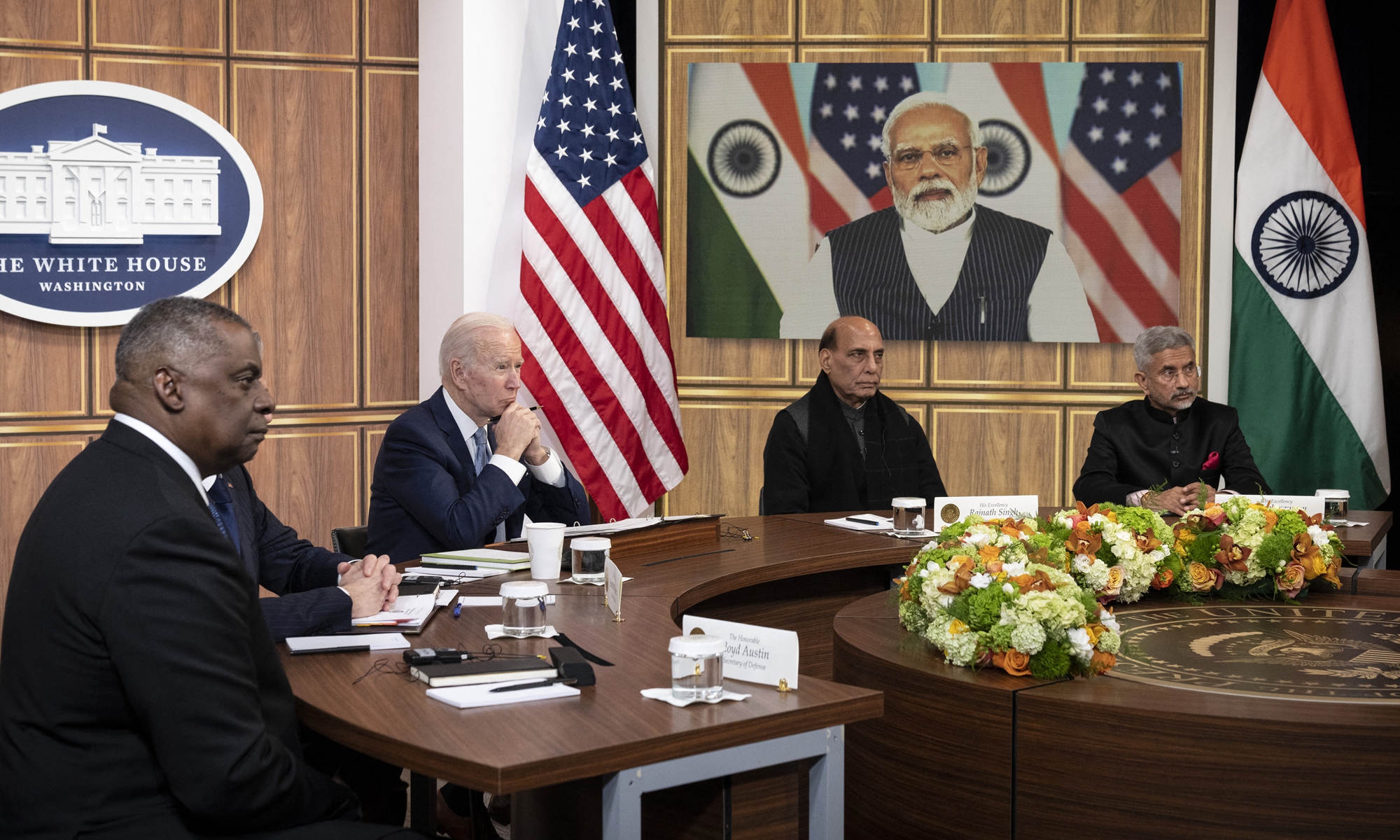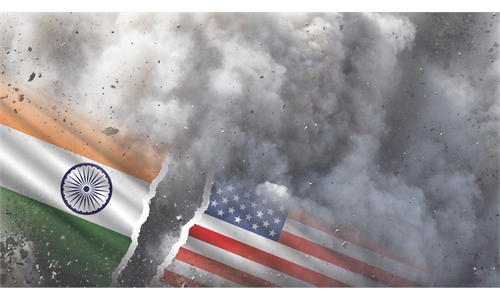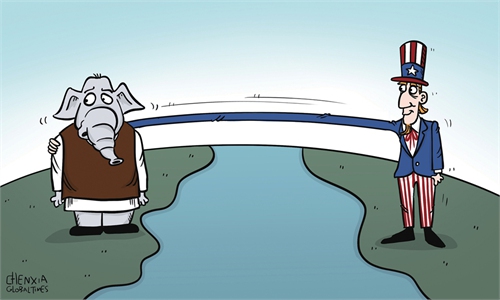
(From left to right) US Defense Secretary Lloyd Austin, US President Joe Biden, Indian Minister of Defense Rajnath Singh, and Indian External Affairs Minister Subrahmanyam Jaishankar listen as Prime Minister of India Narendra Modi (on screen) speaks during a virtual meeting in the South Court Auditorium of the White House complex April 22, 2022 in Washington, DC. Photo: AFP
US President Joe Biden met virtually with Indian Prime Minister Narendra Modi on Monday. After that, the meeting between their foreign and defense ministers, known as the 2+2 Dialogue, will take place in Washington. Before the meeting, Washington was high profile, repeatedly underlining that the US and India share "common values and resilient democratic institutions," and reaffirmed their shared interests and commitments in the Indo-Pacific region. But a great deal of time has been spent on discussing the Russia-Ukraine conflict, and the response of New Delhi obviously differs from that of Washington.Everyone can see that no matter how much the US emphasizes its strategic partnership with India, no matter how euphemistic it sounds, it cannot cover up the big divergence between the two countries on the Russia-Ukraine conflict, nor will it change the fact that US pressure on India to condemn Russia is the theme of their meeting. The parties concerned are fully aware of this. US Deputy Secretary of State Wendy Sherman recently bluntly stated that "We, obviously, would prefer that India move away from their long-term history of non-alignment G77 partnership with Russia." This aroused the anger of many netizens in India: "India does not belong to the United States." "India wants the United States to stop aligning with any country. Will the United States listen?"
The US and India have had close interactions over the past two years. Especially in a bid to woo India and contain China, Washington has become the spokesperson of New Delhi in international public opinion arena, casting a rose-colored shade on US-India relations. However, the "boat of their friendship" could not withstand the storm of the Ukraine crisis, and their differences in stance and interests have emerged.
According to the principle of independent diplomacy, India's choice to safeguard its own national interests is inconsistent with the direction expected by the US, and has been warned of the "consequences" by Washington's "murderous" intentions. Of course, India does not buy it. As long as a major country adheres to strategic autonomy, it will not remain on the same page with Washington on all issues, and there must be differences. However, Washington has never accepted, disrespected or even rejected and contained the strategic autonomy of other major countries, and has been taking coercive actions such as inducements to suppress their growth.
The BRICS countries, including India, have refused to participate in sanctions against Russia. Not only has India not suspended trade with Russia, it has also substantially increased Russian energy imports. As a member of the Quad, India does not follow the US' lead. This has embarrassed the US. This also shows that Washington's capabilities are increasingly out of step with its strategic ambitions, and the scope it can control is limited or becoming more and more limited. There are only a few "satellite states" of the US, and the international situation will not and should not evolve with Washington's baton.
The US has put itself in an awkward position. Despite grievances, its tone toward India is obviously softer than toward China, because it does not want to undermine the prospects of Quad and the "Indo-Pacific Strategy" mechanisms that it has painstakingly orchestrated to contain China. It is not appropriate to use the tactic of "coercion" against India, while the US has nothing to lure India. However, what embarrasses Washington is that if it lets India go, then its so-called "democracy vs. autocracy battle" rhetoric will be self-defeating, and the comprehensive sanctions network of the US and the West against Russia will not be formed.
For the US which keeps calculating geopolitical interests, playing the two-face game is its routine tactic. In the past few years, when it wants to win it over to serve Washington's global strategy, India would become the "largest democratic country;" when it wants to show the systematic superiority of the Western world, India would become a country with "rising nationalism." But the foreign policy which hypocritically manipulates other countries does not always work. Amid the Ukraine crisis, New Delhi did not stand with Washington when the US tried to repeat its same old trick of forcibly dividing the world into the two camps of "democracy" and "autocracy."
The US is now very anxious that India, the world's "largest democracy," is missing from the "democratic camp" for sanctions carefully crafted by the US. US hypocrisy, bullying and arrogance have been more and more recognized and rejected by the other countries, while Washington's elites are still indulged in arrogance without knowing it. Against such a background, it will be increasingly impossible for the US to rely on a set of clichés to maintain its hegemony.



